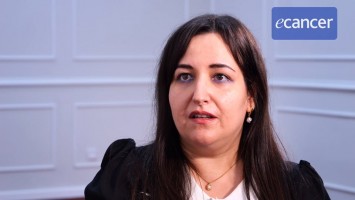World Oncology Forum 2015
Barriers to preventive therapy for breast and other major cancers and strategies to improve uptake
Dr Andrea DeCensi - Ente Ospedaliero Ospedali Galliera, Genova, Italy
The data showed that, particularly for breast cancer prevention where we have relatively old trials with tamoxifen or raloxifene, the prevalence of the use in the general population in the United States is below 1% of the eligible population. So the women at increased risk of breast cancer do not take this drug, despite the evidence that this drug can halve the incidence of breast cancer which is a huge accomplishment.
Why do you think this is?
There are a variety of reasons, one, I think it’s the fear of side effects. The second reason is that perhaps this is more a scientific argument, there’s no evidence of a mortality effect yet. For the Europeans one important reason is that these drugs are off-label because Europe has never registered this indication except for the UK last year. So if you prescribe tamoxifen for prevention of breast cancer you do it off-label and this may have liability issues for the doctors. Then there are a variety of other reasons, including the people don’t know that you have drugs to prevent cancer, they ignore it. Also the medical community is not very well informed. All these drugs are generic so they cost €2-3 per month, there’s no commercial pressure and we know that this is very important for the whole world of medicine and prescription. And other reasons. Another very important reason that I forgot is we don’t have biomarkers like in cardiovascular medicine. You take the drug, your blood pressure goes down, your cholesterol goes down immediately and you see the effect. Of course you don’t take the drug to lower cholesterol per se but because we know that cholesterol is the risk factor for myocardial infarction. In our field of oncology we don’t have these clever biomarkers which are surrogate of the clinical preventive effect. So it’s a very complex area but is a new field and we are quite optimistic.
What strategies can be employed to overcome this problem?
There are a variety of proposals. One thing that has been said is that to nest prevention with screening so, for instance, taking the women who undergo mammography and if they have an increased risk algorithm with family history, a history of biopsies and also a dense mammography, they can be approached by, say, a research nurse to explain that there are opportunities not only to survey their breast but also to reduce the risk that they develop cancer.
We work extensively on dose reductions, so searching the optimal dose for prevention which may be lower than for therapy, for instance with tamoxifen. We have seen actually that lowering the dose you retain the benefits and you reduce the risk. So there are a variety of approaches and also some include psychological aspects of dealing with a risk perception and worry of cancer. There are data, and we have shown also, that if you heighten risk perception in women who are already worried about cancer, that may be a detrimental strategy because they tend to escape. There is an avoidant attitude. So we have to be very careful in increasing too much our awareness of risk.
What about drug repurposing and its role in prevention?
That’s my real passion, is to use old drugs which are very inexpensive, we know they are very safe and can have a broad biological effect, not only including cancer because we are talking about prevention here, so healthy people who want to maintain health. So the king of this repositioning drugs is aspirin. And now we have an interesting statement from the US Preventive Services Taskforce which stated that everyone between the age of 50 and 59 should take aspirin if they have a slightly increased risk of cardiovascular disease, also to prevent colorectal cancer. So we will see whether this governmental statement has an impact on the use of aspirin because the data on the prevention of colorectal cancer now are quite compelling.
There are other drugs like metformin, for instance, which is an anti-diabetic drug but we know now that the connection between obesity, insulin resistance and cancer is very strong. This drug has been shown to be associated with a reduced risk of several cancers in epidemiological studies. There are several trials underway, we have done some of those. I think it’s a very promising agent for people who are overweight or obese or have insulin resistance.








